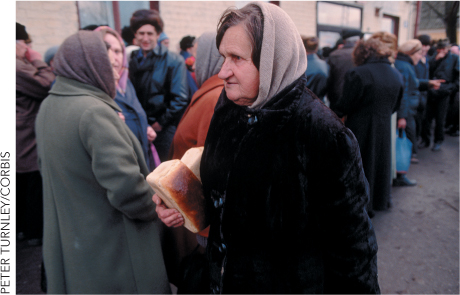Universal Price Controls
We have seen that price controls in the United States caused shortages, lineups, delays, quality reductions, misallocations, bureaucracy, and corruption. And the U.S. experience with extensive price controls was short, just a few months for most goods, and a few years for oil and a handful of other goods. What would happen if price controls on all goods remained in place for a lengthy period of time? An economy with permanent, universal price controls is in essence a “command economy,” much as existed in the Communist countries prior to the fall of the Berlin Wall. In The Russians, Hedrick Smith described what it was like for consumers living in the Soviet Union in 1976:18
The list of scarce items is practically endless. They are not permanently out of stock, but their appearance is unpredictable…. Leningrad can be overstocked with cross-country skis and yet go several months without soap for washing dishes. In the Armenian capital of Yerevan, I found an ample supply of accordions but local people complained that they had gone for weeks without ordinary kitchen spoons or tea samovars. I knew a Moscow family that spent a frantic month hunting for a child’s potty while radios were a glut on the market ….
The accepted norm is that the Soviet woman daily spends two hours in line, seven days a week…. I have known of people who stood in line 90 minutes to buy four pineapples … three and a half hours to buy three large heads of cabbage only to find the cabbages were gone as they approached the front of the line, 18 hours to sign up to purchase a rug at some later date, all through a freezing December night to register on a list for buying a car, and then waiting 18 months for actual delivery, and terribly lucky at that.

The never ending shortage of goods in the Soviet Union suggests another reason why price controls are not eliminated even when doing so would make most people better off. Shortages were beneficial to the very same party elite who controlled prices. With all goods in permanent shortage, how did anyone in the Soviet Union obtain goods? By using blat. Blat is a Russian word meaning one has connections that can be used to get favors. As Hedrick Smith put it:
In an economy of chronic shortages and carefully parceled-out privileges, blat is an essential lubricant of life. The more rank and power one has, the more blat one normally has … each has access to things or services that are hard to get and that other people want or need.
CHECK YOURSELF
Question 8.5
 In the 1984 movie Moscow on the Hudson, a Soviet musician defects to the United States. Living in New York, he cannot believe the availability of goods and finds that he cannot break away from previous Soviet habits. In one memorable scene, he buys packages and packages of toilet paper. Why? Using the concepts from this chapter, explain why hoarding occurs under price controls and why it is wasteful.
In the 1984 movie Moscow on the Hudson, a Soviet musician defects to the United States. Living in New York, he cannot believe the availability of goods and finds that he cannot break away from previous Soviet habits. In one memorable scene, he buys packages and packages of toilet paper. Why? Using the concepts from this chapter, explain why hoarding occurs under price controls and why it is wasteful.
Question 8.6
 Shortages in the former Soviet Union were very common, but why were there also surpluses of some goods at some times?
Shortages in the former Soviet Union were very common, but why were there also surpluses of some goods at some times?
Consider the manager of a small factory that produces radios. Music may be the food that feeds people’s souls but the manager would also like some beef. Shortages mean that the manager’s salary is almost useless in helping him to obtain beef but what does he have of value? He has access to radios. If the manager can find a worker in a beef factory who loves music, he will have blat, a connection and something to trade. Even if he can’t find someone with the exact opposite wants as he has, access to radios gives the manager power because people will want to do favors for him. But notice that the manager of the radio factory has blat only because of a shortage of radios. If radios were easily available at the market price, then the manager’s access would no longer be of special value. The manager of the radio factory wants low prices because then he can legally buy radios at the official price and use them to obtain goods that he wants. Ironically, the managers and producers of beef, purses, and televisions all want shortages of their own good even though all would benefit if the shortages of all goods were eliminated.
Blat is a Russian word but it’s a worldwide phenomena. Even in the United States, where by world standards corruption is low, blat happens. During the 1973–1974 oil crisis, for example, when the Federal Energy Office controlled the allocation of oil, it quickly became obvious that the way to get more oil was to use blat. Firms began to hire former politicians and bureaucrats who used their connections to help the firms get more oil. Today, the blat economy is much larger—about half of all federal politicians who leave office for the private sector become lobbyists.